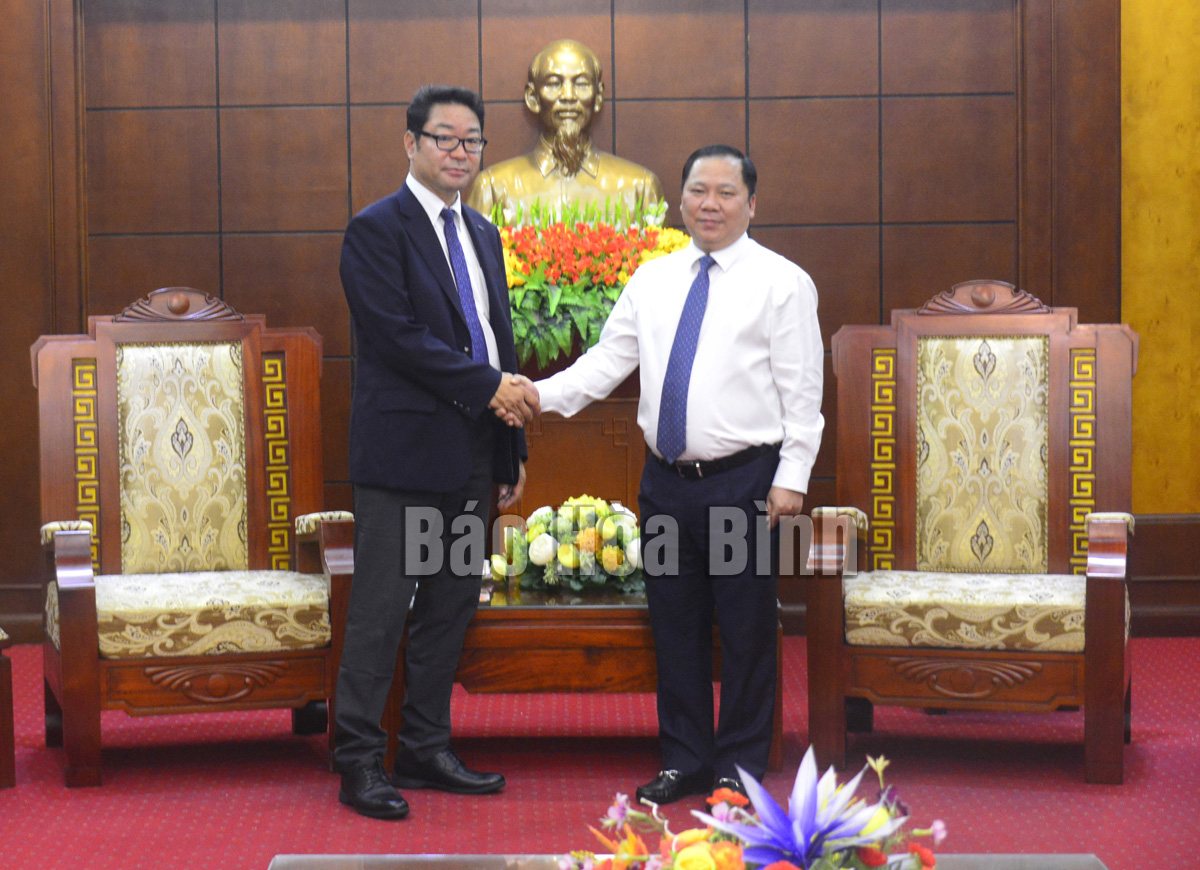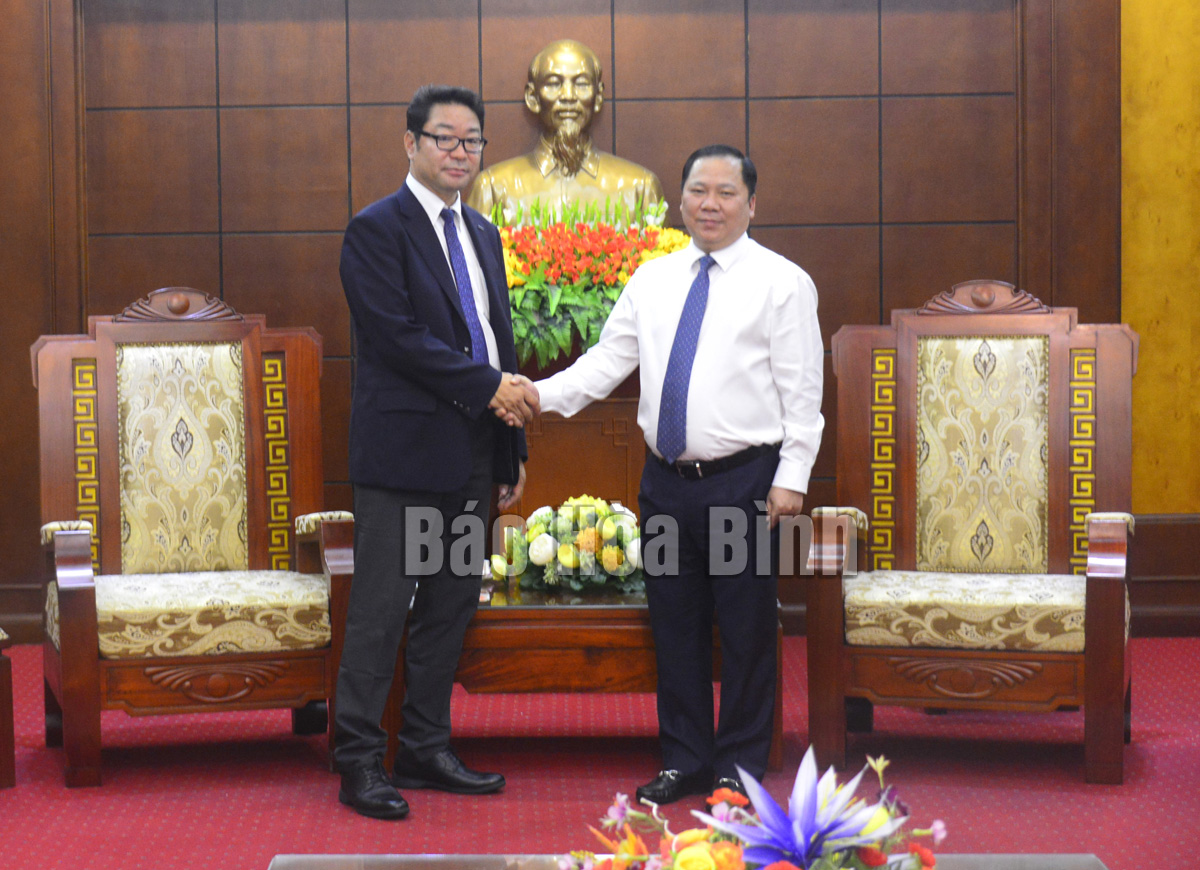
(HBO) - Meiko Electronics Co., Ltd, a Japanese corporation, is implementing a 200 million USD project to build a factory producing various types of electronic circuits in the industrial zone on the left bank of the Da River, Hoa Binh city. At a meeting with the firm on June 8, Nguyen Phi Long, alternate member of the Party Central Committee and Secretary of the Hoa Binh province Party Committee, affirmed a consistent standpoint of always supporting and accompanying enterprises in effectively carrying out projects. He pledged to create maximum conditions for Meiko Electronics to successfully operate in the locality.
Nguyen Phi
Long, alternate member of the Party Central Committee and Secretary of the Hoa
Binh province Party Committee, receives a leader of Meiko Electronics Co., Ltd.
Atsushi Sakate, executive vice president of Meiko, said the corporation
has invested in building three electronic circuit manufacturing and PCB
assembly plants in Vietnam with a total investment of up to 500 million USD.
Such investment has so far created over 7,000 jobs and contributes
approximately 30 million USD to the state budget annually, he elaborated.
Covering 9.2ha, the ongoing electronic circuits
production project in Hoa Binh is set to also work on handling pollution,
collecting and treating wastewater, emission gas, and solid waste, and
recycling and reusing waste materials. It is approved to operate foru 50 years.
Meiko has planned to construct office buildings
and workshops between Q4 of 2022 and Q4, 2023; purchase, transport, and install
machinery and equipment as well as recruit and train employees in Q1 and Q2
next year; and conduct trial production and subsequently commence full-scale
operation from the next Q2 onward. The estimated number of workers to be
employed is around 3,000 by 2030. The projected contribution to the state
budget will be approximately 200 billion VND (8.5 million USD) per year when
the factory reaches its full production capacity in 2030.
Meiko said it hopes to continue receiving
support from the Hoa Binh authorities to successfully implement the project.
Chu Van Thang, head of the management board of
the provincial industrial zones, stated that the project is significant as it
promotes economic restructuring, addresses employment issues, contributes to
the state budget, and increases export value. Over the recent times, the
province has directed relevant departments and agencies to create favourable
conditions for its implementation in line with the plan, with Meiko’s proposals
resolved, Thang said.
Quach Tat Lien, Vice Chairman of the Provincial
People's Committee, pledged that the province will always accompany Meiko in
such a process by facilitating investment procedures and land provision for the
company to build worker accommodations.
He expressed his desire for the corporation to
closely follow the province's investment direction and expedite the
construction progress./.
According to data from the Hoa Binh Provincial Party Committee, the industrial production index for the first six months of 2025 is estimated to have increased by 20% compared to the same period last year. This marks the highest year-on-year growth rate for this period since 2020.
In the first six months of 2025, Hoa Binh province’s export turnover was estimated at 1.145 billion USD, marking an 18.11% increase compared to the same period in 2024. Import turnover was estimated at $ 804 million, a 17.15% increase, which helped the province maintain a positive trade balance.
The lives of the ethnic minority farmers in Tan Lac district have gradually improved thanks to the new directions in agricultural production. This is a testament to the collective strength fostered through the professional associations and groups implemented by various levels of the district’s Farmers’ Union.
With the motto the "product quality comes first,” after nearly one year of establishment and operation, Muong village’s Clean Food Agricultural and Commercial Cooperative, located in Cau Hamlet, Hung Son Commune (Kim Boi district), has launched reputable, high-quality agricultural products to the market that are well-received by consumers. The products such as Muong village’s pork sausage, salt-cured chicken, and salt-cured pork hocks have gradually carved out a place in the market and they are on the path to obtaining the OCOP certification.
In the past, the phrase "bumper harvest, rock-bottom prices" was a familiar refrain for Vietnamese farmers engaged in fragmented, small-scale agriculture. But today, a new spirit is emerging across rural areas of Hoa Binh province - one of collaboration, organisation, and collective economic models that provide a stable foundation for production.
Maintaining growing area codes and packing facility codes in accordance with regulations is a mandatory requirement for agricultural products to be eligible for export. Recently, the Department of Agriculture and Environment of Hoa Binh province has intensified technical supervision of designated farming areas and packing facilities to safeguard the "green passport" that enables its products to access international markets.



